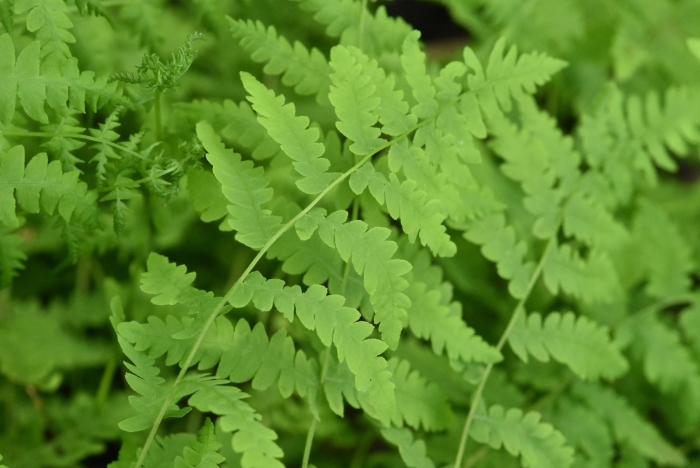Marsh Fern
(Thelypteris palustris)
Marsh Fern (Thelypteris palustris)
/
/

Марина Садыкова
CC BY 4.0
Image By:
Марина Садыкова
Recorded By:
Copyright:
CC BY 4.0
Copyright Notice:
Photo by: Марина Садыкова | License Type: CC BY 4.0 | License URL: http://creativecommons.org/licenses/by/4.0/ | Rights Holder: Марина Садыкова | Publisher: iNaturalist | Date Created: 2023-07-16T09:10:07-07:00 |

























Estimated Native Range
Summary
Thelypteris palustris, commonly known as the marsh fern, is a perennial herbaceous plant native to a variety of wetland habitats including swamps, bogs, marshes, and wet meadows in eastern North America and Eurasia. It thrives in acidic, nutrient-poor conditions often found in these ecosystems. The marsh fern typically grows 1-2.5 feet tall and features fronds with 10-40 pairs of leaflets, which are bright green and have a somewhat lacy appearance. The plant does not produce showy flowers, as it reproduces by spores that are located in sori on the underside of the fronds.
The marsh fern is valued for its ability to thrive in wet conditions, making it suitable for water gardens, rain gardens, and restoration projects. It is also being researched for phytoremediation purposes due to its potential to reduce zinc and copper levels in contaminated soils. In cultivation, Thelypteris palustris prefers consistently moist to wet soils and can tolerate full sun to part shade. While it is not prone to serious diseases or pests, it can be sensitive to drought and may require additional watering during dry periods. The marsh fern is the only known host plant for the marsh fern moth, Fagitana littera, which can be a point of interest for those looking to support local wildlife.CC BY-SA 4.0
The marsh fern is valued for its ability to thrive in wet conditions, making it suitable for water gardens, rain gardens, and restoration projects. It is also being researched for phytoremediation purposes due to its potential to reduce zinc and copper levels in contaminated soils. In cultivation, Thelypteris palustris prefers consistently moist to wet soils and can tolerate full sun to part shade. While it is not prone to serious diseases or pests, it can be sensitive to drought and may require additional watering during dry periods. The marsh fern is the only known host plant for the marsh fern moth, Fagitana littera, which can be a point of interest for those looking to support local wildlife.CC BY-SA 4.0
Plant Description
- Plant Type: Fern
- Height: 0.5-2 feet
- Width: 1-2 feet
- Growth Rate: Moderate
- Flower Color: N/A
- Flowering Season: Non-Flowering
- Leaf Retention: Deciduous
Growth Requirements
- Sun: Full Sun, Part Shade
- Water: Medium, High
- Drainage: Medium, Slow
Common Uses
Erosion Control, Low Maintenance, Water Garden
Natural Habitat
Native to swamps, bogs, marshes, and wet meadows in eastern North America and Eurasia
Other Names
Common Names: Marsh Fern, Meadow Fern
Scientific Names: , Thelypteris palustris, ? pufferii, Acrostichum palustris, Aspidium thelypteris f. pufferii, Polypodium pteroides, Thelypteris palustris var. pufferii, Thelypteris thelypteroides subsp. glabra,
GBIF Accepted Name: